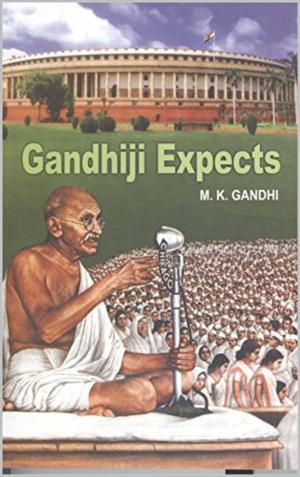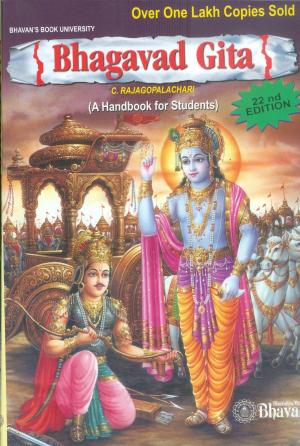| Author: | M.K.Gandhi | ISBN: | 1230001654905 |
| Publisher: | Kar Publishing | Publication: | April 24, 2017 |
| Imprint: | Language: | English |
| Author: | M.K.Gandhi |
| ISBN: | 1230001654905 |
| Publisher: | Kar Publishing |
| Publication: | April 24, 2017 |
| Imprint: | |
| Language: | English |
My Religion by M.K.Gandhi
Edited by Bharathan Kumarappa
Pages - 198
As Gandhiji's life consisted in nothing but seeking to practise his religion to the best of his ability, an attempt has been made in this volume to present to the reader extracts from Gandhiji's writings and speeches, which will give a fairly full picture of Gandhiji's religion.
The task has not been easy. The very fact that religion was the mainspring of Gandhiji's activities means that all that he said and did throughout his public career, not only in the realm of religion proper but also in the spheres of politics, economics and social life, become relevant to this volume. For him a religion which did not concern itself with every side of life was no religion at all. That being the case, no account of his religion can be adequate which does not present his entire philosophy of conduct, whether in individual or social life.
Consequently, we have had a very wide field to cover. At the same time to keep this volume small, we have had to select very carefully, seeking however in the process of elimination not to leave out anything of significance.
Gandhiji was born a Hindu. But his Hinduism was his own. It had its roots firm in ancient Hinduism, but it grew and developed in the light of his contact with other religions, more especially Christianity, as will be seen from Section Two of this volume. He sought to drink at the spring of all religions, and therefore he felt that he belonged to every religion. And yet, if he had to have a label, the label he preferred and which was his not only by right of birth but also intrinsically, was Hinduism, the religion of his forefathers. In learning from every religion with which he came in contact, Gandhiji was not by any means doing injustice to Hinduism or departing from its essential teachings. For the genius of Hinduism itself through all its long history has always been to assimilate and synthesize whatever new element it came up against. Not being tied down to a creed or to a founder, it was thus free to learn, grow and develop. Gandhiji illustrates in himself this youthful spirit of Hinduism, which has kept it ever fresh, ever living and ever growing. Indeed, it may be truly said that in this respect in Gandhiji Hinduism found its own soul.
Hinduism had in the past, together with Buddhism, its offspring, influenced all the known countries of the then civilized world, from India to China and Japan. Today through Gandhiji Hinduism is undergoing rebirth, and India's message of peace and non-violence is listened to with respect by all the nations. There is no doubt that if the religion of Gandhiji could spread throughout the length and breadth of this land, India could still be a powerful factor in weaning the world from materialism, avarice and strife, which are threatening mankind with complete destruction.
Gandhiji's message, however, is not only for India but for all the world. As he himself said, he did not seek to recapture only the spirit of Hinduism but the spirit of all religions, which, according to him, is love of God expressing itself in love of fellow-beings. His call is therefore not that others should become Hindus, but that Christians, Buddhists, Muslims and others should live up to the best teachings of their own religion. Only thus, he expected, man can live in peace with his fellowman and promote each other's welfare. Both Hindus and non- Hindus should therefore find a challenge, inspiration and guidance in the living of the good life, from a study of this book.
Owing to limitations of space we could give but a bare outline of Gandhiji's views on social affairs. Those who would like fuller details may turn to other books published by the Navajivan Publishing House, Ahmedabad-14, such for example as Sarvodaya, Towards Non-violent Socialism, Women and Social Injustice, Removal of Untouchability, For Pacifists and Hindu Dharma.
My Religion by M.K.Gandhi
Edited by Bharathan Kumarappa
Pages - 198
As Gandhiji's life consisted in nothing but seeking to practise his religion to the best of his ability, an attempt has been made in this volume to present to the reader extracts from Gandhiji's writings and speeches, which will give a fairly full picture of Gandhiji's religion.
The task has not been easy. The very fact that religion was the mainspring of Gandhiji's activities means that all that he said and did throughout his public career, not only in the realm of religion proper but also in the spheres of politics, economics and social life, become relevant to this volume. For him a religion which did not concern itself with every side of life was no religion at all. That being the case, no account of his religion can be adequate which does not present his entire philosophy of conduct, whether in individual or social life.
Consequently, we have had a very wide field to cover. At the same time to keep this volume small, we have had to select very carefully, seeking however in the process of elimination not to leave out anything of significance.
Gandhiji was born a Hindu. But his Hinduism was his own. It had its roots firm in ancient Hinduism, but it grew and developed in the light of his contact with other religions, more especially Christianity, as will be seen from Section Two of this volume. He sought to drink at the spring of all religions, and therefore he felt that he belonged to every religion. And yet, if he had to have a label, the label he preferred and which was his not only by right of birth but also intrinsically, was Hinduism, the religion of his forefathers. In learning from every religion with which he came in contact, Gandhiji was not by any means doing injustice to Hinduism or departing from its essential teachings. For the genius of Hinduism itself through all its long history has always been to assimilate and synthesize whatever new element it came up against. Not being tied down to a creed or to a founder, it was thus free to learn, grow and develop. Gandhiji illustrates in himself this youthful spirit of Hinduism, which has kept it ever fresh, ever living and ever growing. Indeed, it may be truly said that in this respect in Gandhiji Hinduism found its own soul.
Hinduism had in the past, together with Buddhism, its offspring, influenced all the known countries of the then civilized world, from India to China and Japan. Today through Gandhiji Hinduism is undergoing rebirth, and India's message of peace and non-violence is listened to with respect by all the nations. There is no doubt that if the religion of Gandhiji could spread throughout the length and breadth of this land, India could still be a powerful factor in weaning the world from materialism, avarice and strife, which are threatening mankind with complete destruction.
Gandhiji's message, however, is not only for India but for all the world. As he himself said, he did not seek to recapture only the spirit of Hinduism but the spirit of all religions, which, according to him, is love of God expressing itself in love of fellow-beings. His call is therefore not that others should become Hindus, but that Christians, Buddhists, Muslims and others should live up to the best teachings of their own religion. Only thus, he expected, man can live in peace with his fellowman and promote each other's welfare. Both Hindus and non- Hindus should therefore find a challenge, inspiration and guidance in the living of the good life, from a study of this book.
Owing to limitations of space we could give but a bare outline of Gandhiji's views on social affairs. Those who would like fuller details may turn to other books published by the Navajivan Publishing House, Ahmedabad-14, such for example as Sarvodaya, Towards Non-violent Socialism, Women and Social Injustice, Removal of Untouchability, For Pacifists and Hindu Dharma.















